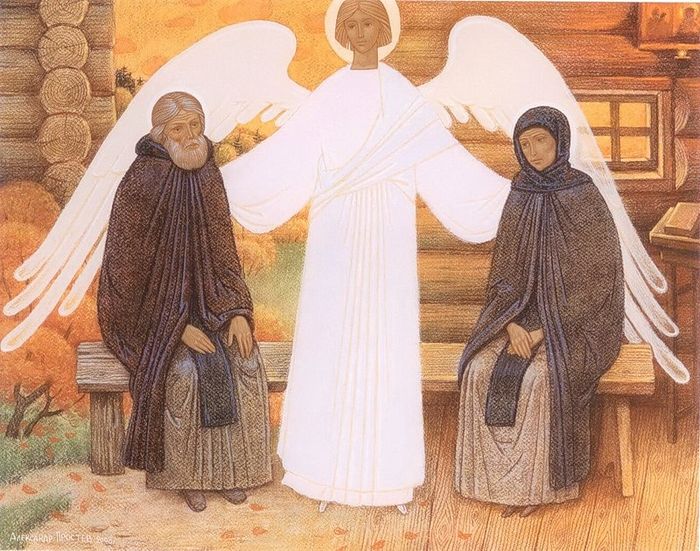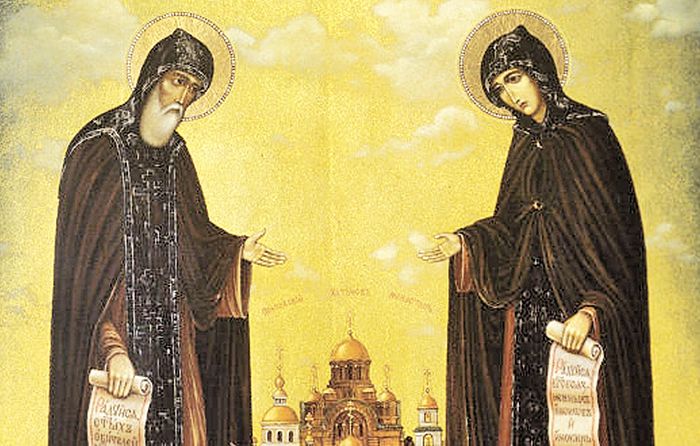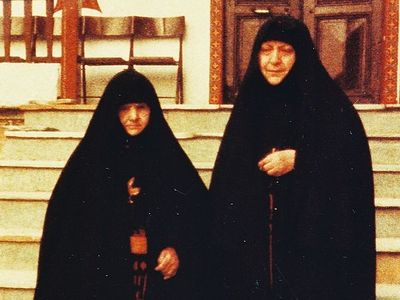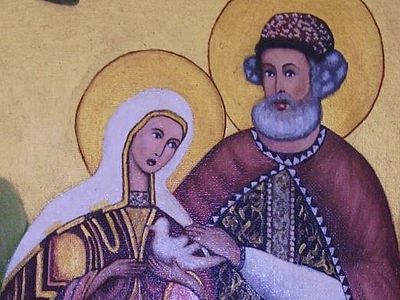We are used to drawing a clear dividing line between monasticism and family life, but there is no fundamental difference between them, because they are one and the same path—the path to God.
It is often said today that today’s Christianity greatly differs from the Christianity of the past, because the world has fundamentally changed and modern civilization leaves a powerful imprint on the life of the Church. Therefore, the conditions of salvation are a little different for us now than those that the holy fathers have taught and teach. In my view, such a judgment is profoundly mistaken, for the world changes only in external, and I must say, irrelevant ways, paradoxical as it may sound, inasmuch as the substance of human life after the Fall remains as before.
The Christianity of previous centuries and of our modern times differs in no way. The tasks of a Christian in the work of salvation remain the same: to fulfill the commandments of the Lord, to pray, to fast, to participate in the Divine services, to do good deeds. It all leads to the acquisition of the spirit of peace, of which the venerable elder Seraphim spoke in his day. The main thing has not changed over the course of Christian history—to try to avoid the two major sins: judgment (Judge not, that ye be not judged, Mt. 7:1), and ingratitude (Rejoice evermore. Pray without ceasing. In every thing give thanks: for this is the will of God in Christ Jesus concerning you, 1 Thess. 5:16-18). If there is gratitude in your heart, if you judge no one, then the “spirit of peace” gradually enters into your soul.
Condemnation also recedes when a man loves all of mankind not abstractly[1], but loves every individual person, and through this love learns to love the whole world, of which every person is a part. The apostle John the Theologian has some remarkable words: Love not the world, neither the things that are in the world. If any man love the world, the love of the Father is not in him (1 Jn. 2:15). Does this mean it’s not necessary to love God’s creation? No, on the contrary, it’s necessary to love it, necessary to admire it, and rejoice in it. But in the verse “the world” refers to sin which deforms the beauty of the created world and ruins it. Then, of course, we must renounce this sin and the life in sin. After all, the true content of worldly life is not in hanging out in clubs and cafes—in activities that ravage the soul… Chores, childbearing, child-rearing, work—this is what worldly life implies, in this consists its true goal. And it’s not only possible—it’s necessary to love! And to thank God for everything that He gives us.
How should such love manifest itself? In our relationships with those around us. We must constantly cultivate benevolence within ourselves. We must try to be an example of a loving person. We must approach everyone with peace, able to distinguish dogmatic truths, the truth of Orthodoxy, from human relationships.
Look, Orthodox Christians have to communicate with various people of other faiths. I had a Muslim neighbor, Ahmed. We always had good conversation, and I can even say we became friends. I always treated him with love. I also had many Jewish acquaintances. I loved them, but it doesn’t mean I observed the Law of Moses. Another example: there’s a Rabbi living in my building, and I treat him with love. We’ve never had any disputes. We’ve always simply sincerely treated one another like human beings.
The Lord says we must love not only our neighbors as ourselves (Mt. 22:39), but even our enemies (Mt. 5:43-45), but here we have no enemies before us. Therefore, I teach all my students: let’s, as they say, share just one thing—our love, which should reveal itself throughout our entire being. And quite another matter is our conviction in the faith, which we must keep, which we must preserve despite any kind and good relations with people of other faiths or nationalities.
We can learn such a friendly, peaceful, and loving attitude towards others, for example, in soaking in the wisdom of the holy fathers and ascetics of the Church. We have wonderful spiritual literature, such as The Lausiac History, or Narrations on the Lives of the Holy and Blessed Fathers where it is shown that we are obliged to learn humility, lowliness of mind, good relationships, and “the spirit of peace” of which we spoke. This is very clearly evident in monastic writings. Monastic writings, I would say, are the focus of our whole spiritual experience. We obtain this experience, in the first place, on our personal paths, but it’s quite simply necessary to learn this experience from the holy fathers, so as not to stumble in haste and zeal.
Of course, reading monastic literature does not mean we all have to become monastics. You often hear that there are two paths: monastic life and family life. However, I usually tell our seminarians: we sometimes do not understand what is a monk. A monk is not so much “one” or “alone” as he is “united.” It means he is ideally united with himself and with God. But unity with God is not only the monastic ideal, but generally of the whole Christian life. And I would even say that monasticism and family life are not two different paths, but two different lanes on one and the same road. What is most important is that this or that path leads to a common goal. But the experience of achieving this goal is precisely the foundational focus of monastic books.
Of course, we must confess that the monastic path is shorter. The worldly path, which I, for example, walk along is connected with many worldly cares. Like it or not, there’s a lot you have to do. If you’re a family man—you have a wife and kids—you have to take care of them, and in this can be many difficulties and unpleasantries. It’s especially important for family people to understand and remember that birthgiving is a great podvig and necessary condition for salvation. Monks have their own cares and woes. Once I asked a monk, “Well, Father, do you pray?” and he answered, “What prayer?! I have such an ailing stomach that there’s nothing in my heart [meaning prayer].” Sickness is also a monastic struggle.
However, worldly life has every kind of care in abundance and constantly distracts from God. To arise for morning and then evening prayer, to go to church, to pray, to participate, and to commune of God is sometimes very hard. Our cares spread us thin, distract us and don’t allow us to focus. The fathers call this phenomenon “περισπασμός,” that is, “distraction” or “diversion.”
Some say now that it’s necessary to “have fun” and often “take your mind off things.” In fact, quite the opposite, it’s necessary to connect with yourself. Why is a monk “united?” Because he prays with his mind and heart, concentrating on the fact that he is the image of God. We waste so much energy trying to restore this image in ourselves in the worldly life, but constantly distract ourselves from this main goal. For example, you have to go to the store: to buy something for your wife, perhaps a dress or boots—the old ones are already useless. Sometimes you’re standing at prayer and all these cares, all this petty “garbage” pops into your head and it distracts you. But for those monks, those perfect examples of holy monks, such as Venerable Pimen the Great, Arsenios the Great, and others, had no such cares.
But the host of saints is huge, including not only those saints who were glorified in performing monastic podvigs, but many who lived in the world, people with families, raising children, and so on. But these people, devoting their lives to family and friends, were found worthy of spiritual heights, such as the apostle Peter, for example. St. Melania the Elder lived in the world at first, but once she was left alone with her sole surviving child she gave him to the care of God and chose the monastic path. She united two paths in her life. Having survived a tragedy (the death of close relatives), she accepted monasticism. Sts. Peter and Fevronia also lived in marriage at first, and then accepted the monastic tonsure.
Moreover, we know examples of holiness and the heights of the spiritual life shown by laymen, to whom God Himself pointed that monks might imitate their perfect lives. We meet such a case in the life of Venerable Macarius of Egypt.
I think a true Orthodox worldly life sooner or later should lead to monasticism. The matter is not even in the formal tonsure. We are used to drawing a clear dividing line between monasticism and family life, but there is no fundamental difference between them, because they are one and the same path—the path to God. The main thing is that everyone should be united. In the Church we are united. We, according to the apostle Paul, make up one body (1 Cor. 12:13). We must understand that every one of us in the Body of Christ has a purpose to fulfill, for the sake of God, for the glory of God, and, of course, for the sake of loved ones.
In this is the Christian truth, unchanging throughout the centuries.






